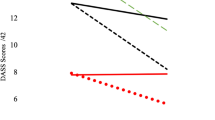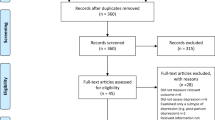Abstract
We examined genetic associations with duloxetine response in generalized anxiety disorder (GAD). Three pooled studies in patients with GAD receiving duloxetine 60–120 mg per day (N=164) or placebo (N=95) were used. Associations between 825 single-nucleotide polymorphisms (SNPs) in 61 candidate genes with change in Hamilton Anxiety Scale scores were examined with set-based testing (adjusted for the number of SNPs within each gene); sets with two-sided adjusted P⩽0.05 were examined using repeated measure analysis. Follow-up analysis explored associations of these SNPs with change in Hamilton Rating Scale for Depression-Anxiety Subscale in a 6-week study in duloxetine-treated patients with major depressive disorder (MDD) (N=241). Variants in corticotropin-releasing hormone receptor 1 (CRHR1), dopamine receptor D3 (DRD3), nuclear receptor subfamily group C, member 1 (NR3C1) and phosphodiesterase 1A (PDE1A) were associated with duloxetine response in GAD. Only rs4792888 in CRHR1 showed modest evidence of association with duloxetine response in MDD (P=0.029 in GAD, P=0.054 in MDD). In conclusion, CRHR1 variation merits investigation in pathophysiology of anxiety and its treatment response.
This is a preview of subscription content, access via your institution
Access options
Subscribe to this journal
Receive 6 print issues and online access
$259.00 per year
only $43.17 per issue
Buy this article
- Purchase on Springer Link
- Instant access to full article PDF
Prices may be subject to local taxes which are calculated during checkout

Similar content being viewed by others
References
Levine J, Cole DP, Chengappa KN, Gershon S . Anxiety disorders and major depression, together or apart. Depress Anxiety 2001; 14: 94–104.
Schosser A, Kasper S . The role of pharmacogenetics in the treatment of depression and anxiety disorders. Int Clin Psychopharmacol 2009; 24: 277–288.
Perlis RH, Fijal B, Adams DH, Sutton VK, Trivedi MH, Houston JP . Variation in catechol-O-methyltransferase is associated with duloxetine response in a clinical trial for major depressive disorder. Biol Psychiatry 2009; 65: 785–791.
Papiol S, Arias B, Gastó C, Gutiórrez B, Catalán R, Fañanás L . Genetic variability at HPA axis in major depression and clinical response to antidepressant treatment. J Affect Disord 2007; 104: 83–90.
Lenze EJ, Mantella RC, Shi P, Goate AM, Nowotny P, Butters MA et al. Elevated cortisol in older adults with generalized anxiety disorder is reduced by treatment: a placebo-controlled evaluation of escitalopram. Am J Geriatr Psychiatry 2011; 19: 482–490.
Uher R, Huezo-Diaz P, Perroud N, Smith R, Rietschel M, Mors O et al. Genetic predictors of response to antidepressants in the GENDEP project. Pharmacogenomics J 2009; 9: 225–233.
Perroud N, Bondolfi G, Uher R, Gex-Fabry M, Aubry JM, Bertschy G et al. Clinical and genetic correlates of suicidal ideation during antidepressant treatment in a depressed outpatient sample. Pharmacogenomics 2011; 12: 365–377.
Serretti A, Chiesa A, Calati R, Massat I, Linotte S, Kasper S et al. A preliminary investigation of the influence of CREB1 gene on treatment resistance in major depression. J Affect Disord 2011; 128: 56–63.
Lenze EJ, Goate AM, Nowotny P, Dixon D, Shi P, Bies RR et al. Relation of serotonin transporter genetic variation to efficacy of escitalopram for generalized anxiety disorder in older adults. J Clin Psychopharmacol 2010; 30: 672–677.
Gorwood P . Generalized anxiety disorder and major depressive disorder comorbidity: an example of genetic pleiotropy? Eur Psychiatry 2004; 19: 27–33.
Davidson JR, Wittchen HU, Llorca PM, Erickson J, Detke M, Ball SG et al. Duloxetine treatment for relapse prevention in adults with generalized anxiety disorder: a double-blind placebo-controlled trial. Eur Neuropsychopharmacol 2008; 18: 673–681.
Hartford J, Kornstein S, Liebowitz M, Pigott T, Russell J, Detke M et al. Duloxetine as an SNRI treatment for generalized anxiety disorder: results from a placebo and active-controlled trial. Int Clin Psychopharmacol 2007; 22: 167–174.
Nicolini H, Bakish D, Duenas H, Spann M, Erickson J, Hallberg C et al. Improvement of psychic and somatic symptoms in adult patients with generalized anxiety disorder: examination from a duloxetine, venlafaxine extended-release and placebo-controlled trial. Psychol Med 2009; 39: 267–276.
Whitmyer VG, Dunner DL, Kornstein SG, Meyers AL, Mallinckrodt CH, Wohlreich MM et al. A comparison of initial duloxetine dosing strategies in patients with major depressive disorder. J Clin Psychiatry 2007; 68: 1921–1930.
Jurinke C, van den Boom D, Cantor CR, Köster H . Automated genotyping using the DNA MassArray technology. Methods Mol Biol 2002; 187: 179–192.
Purcell S, Neale B, Todd-Brown K, Thomas L, Ferreira MA, Bender D et al. PLINK: a tool set for whole-genome association and population-based linkage analyses. Am J Hum Genet 2007; 81: 559–575.
Gillespie CF, Phifer J, Bradley B, Ressler KJ . Risk and resilience: genetic and environmental influences on development of the stress response. Depress Anxiety 2009; 26: 984–992.
Thode K, Beuten J, Maher BS, Birmaher B, Ryan ND, Williamson DE . Hypothalamic-Pituitary-Adrenal axis activation in response to stress is moderated by polymorphic variants within the corticotropin-releasing hormone receptor 1. Biol Psychiatry 2008; 63 (Suppl 7): 85S (abstract 255).
Tyrka AR, Price LH, Gelernter J, Schepker C, Anderson GM, Carpenter LL . Interaction of childhood maltreatment with the corticotropin-releasing hormone receptor gene: effects on hypothalamic-pituitary-adrenal axis reactivity. Biol Psychiatry 2009; 66: 681–685.
Liu Z, Zhu F, Wang G, Xiao Z, Tang J, Liu W et al. Association study of corticotropin-releasing hormone receptor1 gene polymorphisms and antidepressant response in major depressive disorders. Neurosci Lett 2007; 414: 155–158.
Licinio J, O’Kirwan F, Irizarry K, Merriman B, Thakur S, Jepson R et al. Association of a corticotropin-releasing hormone receptor 1 haplotype and antidepressant treatment response in Mexican-Americans. Mol Psychiatry 2004; 9: 1075–1082.
Coric V, Feldman HH, Oren DA, Shekhar A, Pultz J, Dockens RC et al. Multicenter, randomized, double-blind, active comparator and placebo-controlled trial of a corticotropin-releasing factor receptor-1 antagonist in generalized anxiety disorder. Depress Anxiety 2010; 27: 417–425.
Acknowledgements
We thank Dr Alexandra Heinloth, Ms Laura Tyler and Ms Barbara McLean for writing and editorial assistance. The parent studies were registered at: http://www.clinicaltrials.gov/ct2/home: NCT00122850, NCT00122863, NCT00122837, and NCT00191061. This work was supported by Eli Lilly and Company and/or any of its subsidiaries.
Author information
Authors and Affiliations
Corresponding author
Ethics declarations
Competing interests
Dr Fijal is a full-time employee of Eli Lilly and Company and Dr Houston is a full-time employee of Lilly USA, LLC. Both are minor stockholders of Eli Lilly and Company. Dr Perlis has received honoraria or consulting fees from Eli Lilly and Company, AstraZeneca, Bristol-Myers Squibb, GlaxoSmithKline, Pfizer and Proteus, and is a stockholder in Concordant Rater Systems, LLC. Ms Dharia is a full-time employee of PharmaNet/i3, a division of inVentiv.
Additional information
Supplementary Information accompanies the paper on the The Pharmacogenomics Journal website
Supplementary information
PowerPoint slides
Rights and permissions
About this article
Cite this article
Perlis, R., Fijal, B., Dharia, S. et al. Pharmacogenetic investigation of response to duloxetine treatment in generalized anxiety disorder. Pharmacogenomics J 13, 280–285 (2013). https://doi.org/10.1038/tpj.2011.62
Received:
Revised:
Accepted:
Published:
Issue Date:
DOI: https://doi.org/10.1038/tpj.2011.62
Keywords
This article is cited by
-
Corticotropin releasing hormone receptor CRHR1 gene is associated with tianeptine antidepressant response in a large sample of outpatients from real-life settings
Translational Psychiatry (2020)
-
Genome-wide association studies of placebo and duloxetine response in major depressive disorder
The Pharmacogenomics Journal (2018)
-
Long-Term Pharmacological Treatments of Anxiety Disorders: An Updated Systematic Review
Current Psychiatry Reports (2016)



